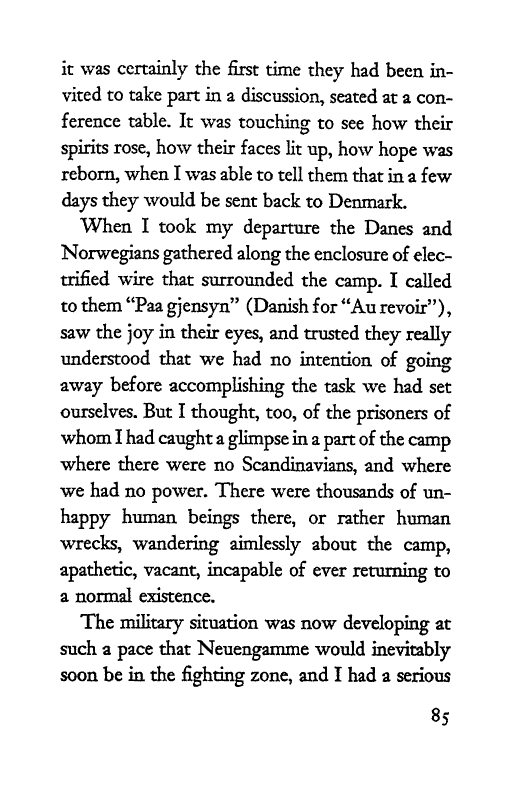Note: Translator Eric Lewenhaupt died in 1968, less than 70 years ago. Therefore, this work is protected by copyright, restricting your legal rights to reproduce it. However, you are welcome to view it on screen, as you do now. Read more about copyright.
Full resolution (TIFF) - On this page / på denna sida - Neuengamme—Hohen-Lüchen March 28th—April 9th

<< prev. page << föreg. sida << >> nästa sida >> next page >>
Below is the raw OCR text
from the above scanned image.
Do you see an error? Proofread the page now!
Här nedan syns maskintolkade texten från faksimilbilden ovan.
Ser du något fel? Korrekturläs sidan nu!
This page has been proofread at least once.
(diff)
(history)
Denna sida har korrekturlästs minst en gång.
(skillnad)
(historik)
it was certainly the first time they had been
invited to take part in a discussion, seated at a
conference table. It was touching to see how their
spirits rose, how their faces lit up, how hope was
reborn, when I was able to tell them that in a few
days they would be sent back to Denmark.
When I took my departure the Danes and
Norwegians gathered along the enclosure of
electrified wire that surrounded the camp. I called
to them “Paa gjensyn” (Danish for “Au revoir”),
saw the joy in their eyes, and trusted they really
understood that we had no intention of going
away before accomplishing the task we had set
ourselves. But I thought, too, of the prisoners of
whom I had caught a glimpse in a part of the camp
where there were no Scandinavians, and where
we had no power. There were thousands of
unhappy human beings there, or rather human
wrecks, wandering aimlessly about the camp,
apathetic, vacant, incapable of ever returning to
a normal existence.
The military situation was now developing at
such a pace that Neuengamme would inevitably
soon be in the fighting zone, and I had a serious
<< prev. page << föreg. sida << >> nästa sida >> next page >>